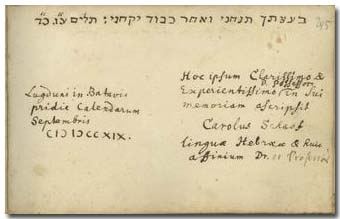

Hoc ipsum Clarissimo & Experientissimo D. Possessori in sui
memoriam ascripsit
Carolus Schaaf
linguae Hebraeae & huic
affinium Dr. et Professor.
Lugduni in Batavis

|
* Ps 73:24: Ba‘atsatekha
tancheni ve’achar kavod yiqacheni. Tilim ayin-gimel kaf-dalet. Vulgate: “tenuisti
manum dexteram meam et in voluntate tua deduxisti me et cum
gloria suscepisti me”. The last word
of the verse is imprecisely quoted by Schaaf: he writes
yiqacheni instead of the Masoretic tiqacheni, that
is, “[he] receives” instead of “[you] receive”.
|
|
|
Thou shalt guide me with thy counsel, and afterward receive me to
glory. Psalms 73:24. *
With this I recommend myself into the memory of
the illustrious and learned owner [of this album].
Karl Schaaf
doctor and professor of Hebrew
and related languages
In Leiden, on the day preceding the calends of
September of 1719
|
p. 245. Leiden, August 31, 1719
Schaaf, Karl
(1646-1729), German orientalist
Karl Schaaf was born on August 28, 1646 in the town of Neuss near
to Düsseldorf, a son of the Hessen-Kassel major Heinrich Schaaf,
and of Katharina Kehls. He lost his father at the age of eight,
but his mother provided him a good education. He studied in
Duisburg, and in 1677 he became professor of Oriental languages.
In 1679 he went to Leiden where he taught Oriental languages, mainly
Aramaic and Syriac. His salary was fixed in a contract of 1681,
and later he obtained a privilege for the instruction of these
languages. In the meantime he was offered various positions by
other universities, but Leiden did not let him go. However, in
1710 Johannes Heyman was appointed professor instead of him; from
then on he helped Heyman in cataloguing the Oriental manuscripts
of the university. He received the title of professor of Oriental
languages only in 1719, after forty years of teaching, when his
salary was raised the third time. He was in correspondence with
the Syriac Bishop of Malabar, that is, of the Thomas Christians.
His son, the orientalist Johannes Heinrich also cooperated with
him. He wanted his son to follow him in his position at the
department, but then Johannes Heinrich was accused of heresy, and
the efforts of his father were frustrated. Karl Schaaf had a
stroke on November 4, 1729, in the middle of working, and he died
on the same day. His most important works: Opus Arameum, complectens grammaticam
Chaldaico-Syriacam … Leiden, 1686. – Novum …
Testamentum Syriacum, cum versione Latina. Leiden, 1709. –
Lexicon Syriacum concordantiale, omnes Novi Testamenti Syriaci
voces. Leiden, 1708. – Epitome grammaticae Hebraeae … ad
iuventutis usum. Leiden, 1716. – Sermo academicus de
linguarum orientalium scientia, suo modo cuivis Christiano,
praecipue autem Theologo intelligenda et aliis explicanda. -
Relatio historica ad epistolam Syriacam a Maha Thome … ex
Chaddenad in Malabaria scriptam … et ipsa illa … epistola
Syriaca, cum versione Latina … Leiden, 1714.
•
AlbSchLeid 134 • Jöcher • Michaud • NNBW IX 952 |